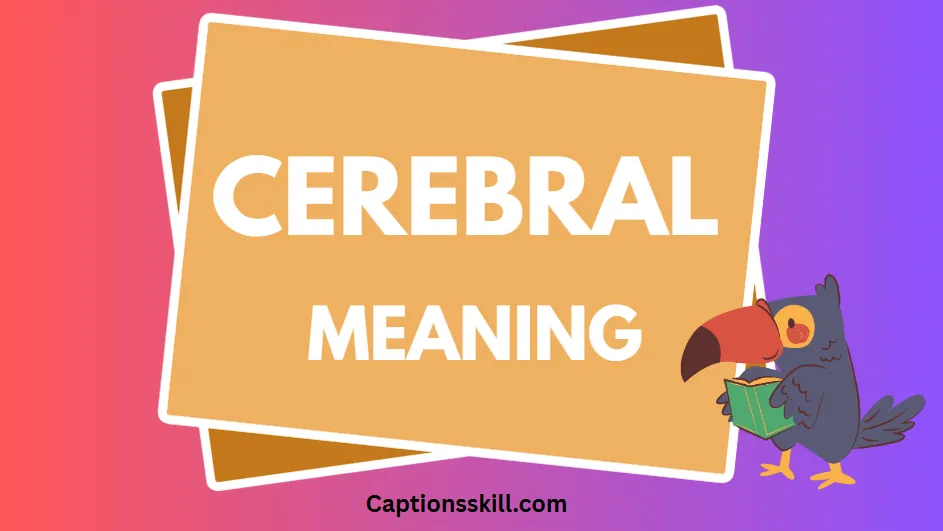Language constantly evolves, and certain words stand out because of how deeply they influence the way we communicate. One such word is “cerebral.” Whether used in literature, education, or casual conversations, this word carries a weight of intelligence and depth. It has become more than just a term—it’s now a reflection of how we interpret intellect, emotion, and thoughtfulness in everyday life.
The word cerebral might sound complex at first, but its meaning is simple once broken down. It relates to the brain and mental activity. People often use it when talking about deep thinkers, intellectual topics, or activities that require logical reasoning. Over time, it has taken on broader meanings, becoming part of modern conversations in various fields including medicine, education, arts, and pop culture.
This article explores the cerebral meaning, its origins, correct usage, related words, and cultural significance. We will look at its use across generations, its dictionary presence, and even explore its meaning in different languages, including Tamil. If you’ve ever wondered whether “cerebral” is just a complex word or something deeper, this guide will help make things clear and easy to understand.
What Does “Cerebral” Mean?
The word cerebral is used to describe anything that is connected to the brain or intellect. As an adjective, it often means “relating to the brain” or “involving deep thinking.” For example, a person who enjoys reading books about philosophy and solving difficult puzzles may be described as having a cerebral personality.
In the medical field, cerebral refers to the brain itself. Terms like cerebral palsy or cerebral cortex are commonly used in this context. In this sense, the word doesn’t deal with personality or character but rather with physical parts of the brain or brain-related conditions.
In everyday language, when someone says a movie is cerebral, they mean that it requires thought, understanding, and attention. It’s not the kind of movie you watch casually. So, the word moves beyond its medical roots and now plays a part in our cultural vocabulary, referring to things that are mentally stimulating.
Whether in a scientific or artistic sense, cerebral always connects to the mind, thought, and higher-level thinking.
The Origin and Evolution of “Cerebral”
The word cerebral has its roots in Latin. It comes from the Latin word “cerebrum”, which directly means brain. The suffix -al was added to form the adjective “cerebral,” meaning “of or relating to the brain.” This transformation began in the early 19th century, when English began absorbing more scientific terms for better classification and medical communication.
As scientific fields like neurology and anatomy developed, terms like cerebral cortex, cerebral hemisphere, and cerebral function became common. Over time, the term evolved beyond medical usage. Writers and thinkers started using “cerebral” to describe things that were intellectually demanding.
In literature and film reviews, calling a story or film “cerebral” became a way to suggest it was smart, layered, and not driven by emotion but by intellect. This transition marked the growth of the word from a technical term into a popular descriptor in many fields including journalism, psychology, and education.
Thus, cerebral evolved from being purely anatomical to becoming symbolic of intelligence and thoughtful engagement.
Is “Cerebral” a Slang, Acronym, or Name?
Cerebral is not slang, an acronym, or a name in common usage. It is a standard English adjective that has roots in academic and scientific vocabulary. While many modern terms evolve as slang or abbreviations, cerebral holds its place in formal and educational English.
That said, the word has gained colloquial relevance, especially in creative industries. For example, if someone calls a friend “too cerebral,” they might be implying that the friend overthinks or is overly rational. In this way, the word takes on a semi-informal tone, depending on context.
In some rare cases, “Cerebral” has been used as a brand name, such as for mental health services or neurological clinics. But these uses are clearly inspired by the word’s original meaning.
Therefore, cerebral remains a formal term, even though it is increasingly being used in creative and casual environments.
“Cerebral” Pronunciation & Spelling
The spelling of “cerebral” is straightforward, but the pronunciation may vary depending on regional accents and emphasis. It is spelled as:
C-E-R-E-B-R-A-L
There are two common ways to pronounce the word:
- /ˈser.ə.brəl/ – This is the American English pronunciation. It sounds like “SERR-uh-bruhl.”
- /səˈriː.brəl/ – This is the British English pronunciation. It sounds like “suh-REE-bruhl.”
Both pronunciations are correct. The difference depends on whether the speaker emphasizes the first or second syllable and whether they use a British or American accent.
Regardless of the variation, the word always carries the same meaning, and it is widely accepted in both spoken and written English.
How People Use “Cerebral” Today
Today, the word cerebral is used in a wide variety of contexts, from medicine to media and personality traits. In modern culture, it is often seen as a compliment or description for anything or anyone that shows a high level of intelligence or thoughtfulness.
In the medical field, terms like cerebral palsy, cerebral hemorrhage, or cerebral cortex are used regularly to describe brain-related conditions or parts of the brain. These are clinical terms used by doctors and scientists around the world.
In education, students who are focused on academics and logical reasoning are often called cerebral learners. This distinguishes them from hands-on or emotional learners.
In the arts, a film, book, or play that makes people think deeply is often labeled cerebral. Critics might say, “This movie is cerebral, not for everyone, but truly rewarding.”
In everyday conversation, people use the word to describe friends, leaders, or celebrities who are quiet thinkers, intellectuals, or those who prefer mental challenges over emotional drama.
In branding and marketing, companies working with brain health, therapy, or intellectual development sometimes include the word “cerebral” in their brand name to highlight their focus.
The rise of mental health awareness has also increased the word’s relevance, especially in connection with terms like cerebral anxiety or cerebral-focused therapy.
Examples of “Cerebral” in a Sentence
- The professor was known for his cerebral teaching style.
- I prefer cerebral thrillers over action-packed movies.
- Her poems are emotional yet deeply cerebral.
- The game is fun but also very cerebral.
- He has a cerebral way of approaching problems.
- The injury affected the cerebral hemisphere of his brain.
- That novel is too cerebral for my taste.
- She’s a cerebral artist who blends logic with creativity.
- The documentary had a cerebral tone that required attention.
- His ideas were cerebral, not easily understood by everyone.
- The student’s cerebral nature earned him a scholarship.
- It’s a cerebral debate, not based on emotion.
- I enjoy conversations that are more cerebral than casual.
- He was diagnosed with cerebral palsy at a young age.
- The painting spoke to me in a very cerebral way.
Other Possible Meanings of “Cerebral”
While “cerebral” primarily relates to the brain and intellect, its meaning can shift slightly depending on the field:
In medical terms, it strictly refers to physical brain-related structures and conditions.
In creative discussions, it refers to mental or intellectual depth, not necessarily the physical brain.
In personality descriptions, it may imply someone who is rational, introverted, analytical, and less emotionally reactive.
In rare branding or abstract use, “cerebral” can also suggest a theme of intelligence or problem-solving as a core value.
Words and Acronyms Related to “Cerebral”
Several related terms help expand the understanding of cerebral:
- Cerebrum: The largest part of the brain.
- Cortex: Outer layer of the brain involved in high-level functions.
- Neurological: Pertaining to the nervous system.
- Cognitive: Related to thinking and reasoning.
- Rational: Based on logic and reason.
- Intellectual: Involving deep thought or intelligence.
- Analytical: Skilled at breaking things into parts to understand better.
- Left-brained: Term used to describe people who are logical and detail-oriented.
None of these are perfect synonyms, but they often appear in discussions involving cerebral qualities.
Is “Cerebral” in the Dictionary?
Yes, “cerebral” is found in all major English dictionaries such as Merriam-Webster, Oxford English Dictionary, and Cambridge Dictionary. The entries generally define it in two main ways:
- Relating to the brain.
- Relating to the intellect or mind.
These definitions show that the word is both a scientific and descriptive term, recognized across many professional and academic domains.
Moreover, some dictionaries include example sentences and usage tips, helping learners use the word correctly in various contexts.
Better Alternatives to Say “Cerebral”
While “cerebral” is a powerful word, there are simpler or alternative words that may suit different tones:
- Intellectual: Focused on thinking and learning.
- Thoughtful: Shows careful thought.
- Analytical: Good at breaking things down to understand.
- Scholarly: Related to deep study and research.
- Cognitive: Related to the brain and thinking.
- Rational: Based on logic.
- Mindful: Aware and mentally present.
These alternatives can be used when you want to express the same idea without sounding too formal or technical.
Cultural and Generational Impact of “Cerebral”
The word “cerebral” has taken on a symbolic value in modern society. In earlier generations, being cerebral was often linked to being quiet, studious, or even boring. But today, with growing respect for mental health and intellectual work, being called cerebral is often seen as a compliment.
In pop culture, we now see more characters in movies and books who are intellectual heroes. Shows like “Sherlock,” films like “The Imitation Game,” and books like “A Beautiful Mind” celebrate cerebral characters. This shift shows that society values mental skills as much as physical ones.
Among younger generations, especially in educational circles and creative fields, “cerebral” often means deep, cool, and wise. It reflects how much people value not just physical beauty or power, but also intellectual strength.
Why It’s Important to Know These Words
Understanding words like “cerebral” helps improve your communication and comprehension skills. It gives you the power to express complex ideas simply and makes your vocabulary richer.
Knowing such words also helps when reading articles, books, or watching films. You understand descriptions better and can relate to characters or arguments more clearly.
It also helps in professional settings, where using the right vocabulary can set you apart. For students, writers, educators, or professionals, knowing and using words like cerebral shows depth and clarity of thought.
The Future of the Word “Cerebral”
The word cerebral will likely continue to evolve in modern use. As the world becomes more focused on mental wellness, creativity, and intelligence, words that describe these traits will gain even more popularity.
Technology and AI development may also increase the usage of the word. We already see it in terms like cerebral interface, used to describe brain-computer technologies.
In the future, cerebral could be part of how we define human uniqueness, as machines take over more physical labor while humans focus on cognitive creativity and emotional intelligence.
Frequently Asked Questions (FAQs)
Q1: What does cerebral mean in simple words?
Cerebral means related to the brain or thinking.
Q2: Is cerebral a good or bad word?
It’s a neutral word but often used positively to describe smart or thoughtful people.
Q3: How do you pronounce cerebral?
You can say “SERR-uh-bruhl” (American) or “suh-REE-bruhl” (British).
Q4: Is cerebral the same as intelligent?
Not exactly, but it often describes someone intelligent or deep-thinking.
Q5: What’s cerebral palsy?
It’s a medical condition that affects movement and is caused by brain damage.
Q6: Is cerebral used in daily life?
Yes, especially in medical, educational, and creative discussions.
Q7: Can I use cerebral in essays?
Yes, it’s formal and perfect for academic writing.
Q8: What are some simple synonyms?
Smart, thoughtful, rational, intelligent.
Q9: Is cerebral in the Tamil language?
In Tamil, cerebral can be translated to “மூளை சம்பந்தமானது” which means related to the brain.
Q10: Is cerebral an adjective?
Yes, it is always used as an adjective.
Conclusion
The word “cerebral” may sound complex, but it holds a powerful and useful place in language. It allows us to describe things related to the brain, intellect, and deep thinking. From science and medicine to creativity and culture, this word has found a home in many fields.
Understanding the cerebral meaning not only improves your vocabulary but also gives you insight into how we value thought and intelligence in society today. Whether you are reading a book, watching a film, or engaging in thoughtful conversations, knowing this word helps you think smarter and speak clearer.
By exploring its meaning, pronunciation, usage, and cultural impact, this article gives you everything you need to confidently use “cerebral” in your daily life.

Jean Moreau is a talented writer known for crafting engaging captions that resonate with audiences. His creativity enhances social media content effectively.






Leave a Reply